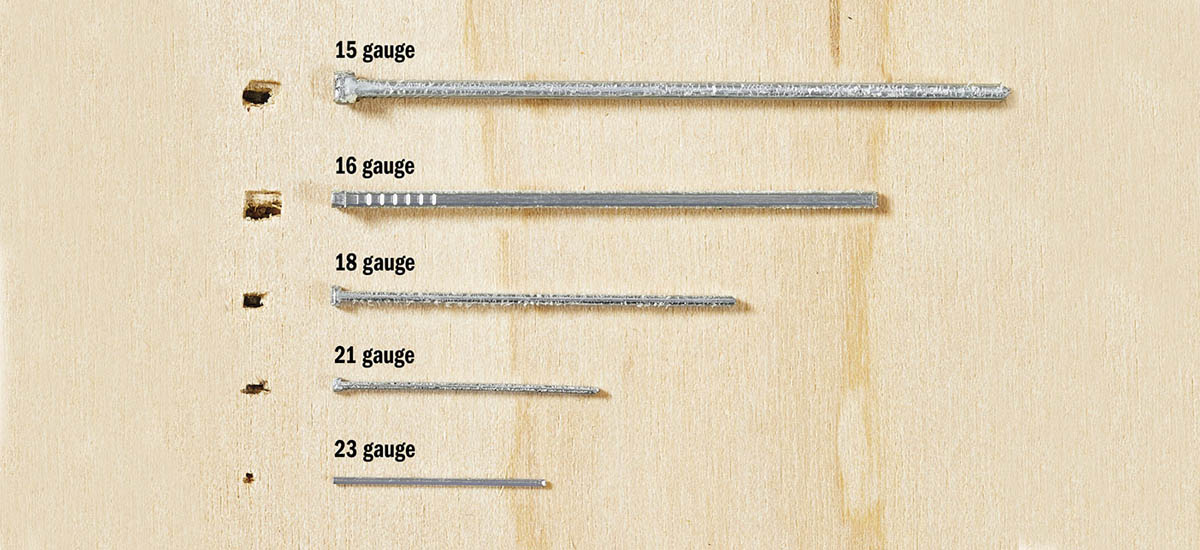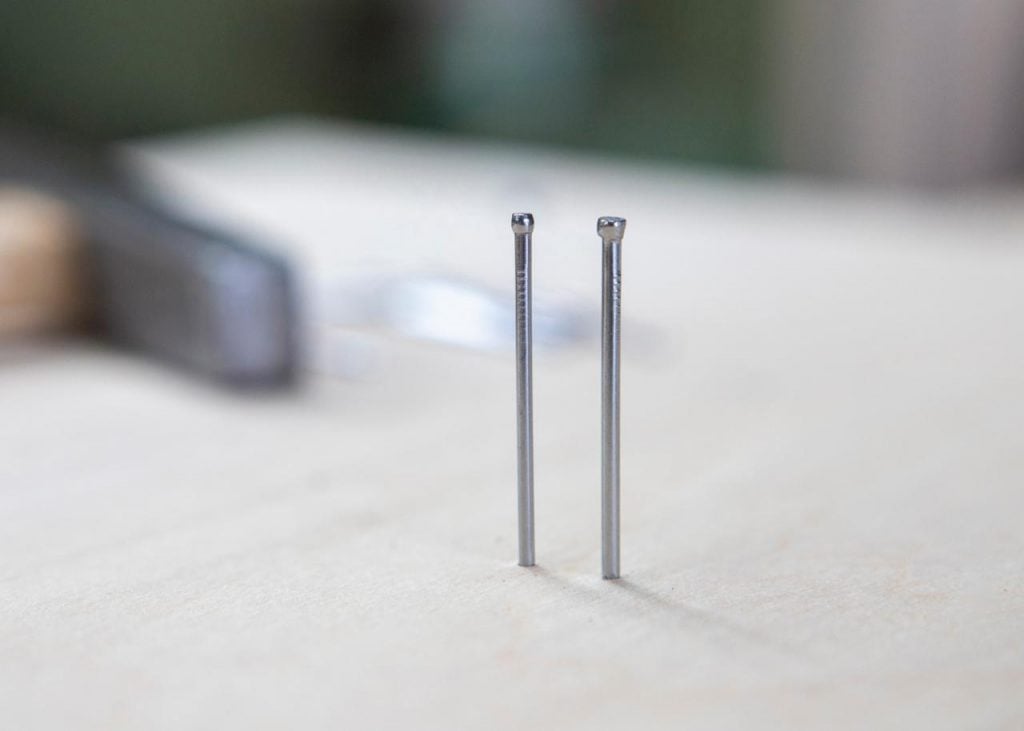Choosing between 18 gauge and 16 gauge nails can feel like a daunting task, especially when you’re eager to get started on your next DIY project or home improvement task. You might wonder how this seemingly small decision could impact the durability and finish of your work.
But here’s the thing: the right choice can make all the difference in the world. Imagine having the confidence that your furniture, trim, or carpentry work will not only look flawless but will also stand the test of time. We’ll break down the differences between 18 gauge and 16 gauge nails, helping you understand which is best suited for your specific needs.
By the end, you’ll have the insights to make an informed decision, ensuring your projects are not only successful but also a source of pride. Stick around, because the details you discover here could save you time, money, and countless headaches.
:max_bytes(150000):strip_icc()/284-Air-Nailer-TipsPhotoNailSizes-2000-228dd4a86d7a4f8e9f767d74c8dda77f.jpg)
Credit: www.woodmagazine.com
Gauge Basics
Choosing between 18 gauge and 16 gauge nails depends on the project’s needs. 18 gauge nails are thinner, ideal for delicate trim work. Meanwhile, 16 gauge nails are thicker, providing extra strength for heavier tasks.
When you’re diving into the world of woodworking or carpentry, understanding nail gauge is essential. The gauge of a nail can significantly affect the outcome of your project. But what exactly does gauge mean, and how does it impact your choice between 18 and 16 gauge nails? Let’s break down the basics.What Does Gauge Mean?
Gauge refers to the thickness of the nail. The lower the number, the thicker the nail. So, a 16 gauge nail is thicker than an 18 gauge nail. This might seem counterintuitive at first, but it’s a crucial detail that influences the strength and appearance of your finished work.Why Does Gauge Matter?
The thickness of the nail affects both holding power and the size of the hole it leaves behind. Thicker nails like 16 gauge offer more holding strength, making them ideal for heavy-duty projects. On the other hand, thinner 18 gauge nails are perfect for delicate trim work where you want minimal impact.Comparing 16 And 18 Gauge Nails
Choosing The Right Gauge For Your Project
Ask yourself: What are you building? If you’re working on heavy cabinets, 16 gauge might be your best friend. But if you’re adding delicate trim, 18 gauge nails could be the better choice. Consider the wood type and the weight it needs to support.My Personal Experience With Nail Gauges
I once chose 18 gauge nails for a bookshelf, thinking they would be less visible. Halfway through, the shelves started to sag. I quickly learned that while thinner nails are less conspicuous, they don’t always provide the strength needed for load-bearing structures. This experience taught me to always match the nail’s strength to the task at hand. Understanding nail gauge basics can make all the difference in your project’s outcome. So, next time you’re at the hardware store, you’ll know exactly which gauge to choose. What’s the first project you’ll tackle with your new knowledge?Material Differences
Choosing the right nail gauge is crucial for any construction or woodworking project. The material differences between 18 gauge and 16 gauge nails can impact your project’s success. Understanding these differences helps in selecting the best option for your specific needs.
Composition And Strength
18 gauge nails are thinner than 16 gauge nails. This makes them less sturdy. They are often made from steel or aluminum. These materials offer decent strength. But, they might bend under heavy pressure. 16 gauge nails are thicker and stronger. Their composition includes robust steel. This makes them ideal for heavy-duty tasks. They resist bending and breaking better.
Flexibility And Durability
18 gauge nails offer more flexibility. They are perfect for delicate work. Projects that need precision benefit from these nails. But their durability is lower compared to 16 gauge nails. 16 gauge nails provide less flexibility. They excel in durability and longevity. Ideal for projects that need long-lasting support.
Common Uses
Choosing the right nail gauge can be confusing. Each gauge has its own set of uses. Understanding the common applications helps in making the right choice. This guide focuses on two popular gauges: 18 and 16. Knowing their typical uses can aid in picking the right one for your project.
18 Gauge Applications
18 gauge nails are thinner and more flexible. They are often used in fine woodworking. Perfect for attaching delicate trim pieces. They leave small holes that are easy to fill. Ideal for baseboards and crown molding. Useful in building furniture or crafting picture frames. Their small size reduces the risk of splitting wood. This makes them perfect for delicate tasks.
16 Gauge Applications
16 gauge nails are thicker and stronger. Often used in heavy-duty projects. They can handle more stress and weight. Ideal for projects needing strong support. Great for installing large crown moldings. Perfect for heavy trim work or hardwood floors. Suitable for framing and cabinetry tasks. Their strength makes them reliable for structural applications.

Credit: hardextools.com
Performance Factors
Choosing between 18 gauge and 16 gauge nails impacts your project. Each has unique performance factors. Understanding these helps you make the right choice for your needs. This blog explores essential performance aspects. Learn how these nails differ in holding power and aesthetics.
Holding Power
16 gauge nails offer stronger holding power. They are thicker and more robust. Use them for heavy-duty projects. They secure larger, heavier materials firmly. For tasks like furniture construction, 16 gauge is reliable. On the other hand, 18 gauge nails are thinner and more delicate. They suit lighter projects better. They are ideal for trim work or smaller woodworking tasks. Consider your project’s weight requirements before choosing.
Aesthetic Considerations
18 gauge nails leave smaller holes. They are less noticeable after finishing. Perfect for decorative trim and molding. They create a cleaner, more polished look. For projects where appearance matters, 18 gauge nails excel. In contrast, 16 gauge nails leave larger holes. Filling and sanding may be required. This can impact the final appearance. Choose based on the visual demands of your project.
Cost Implications
Choosing between 18 gauge and 16 gauge nails impacts cost. Thicker 16 gauge nails often cost more. Thinner 18 gauge nails are usually cheaper and work well for light projects.
When considering the cost implications of 18 gauge versus 16 gauge nails, it’s important to understand how these choices can impact your budget and project outcomes. The price difference between the two can be subtle yet significant, affecting your bottom line and the quality of your work. Let’s break down the financial aspects to help you make an informed decision.Price Per Unit
The cost per nail can vary depending on the gauge. Typically, 18 gauge nails are less expensive than their 16 gauge counterparts. This is due to their thinner design and the materials used in production. However, you might find that buying in bulk often reduces the price difference. Check various suppliers and compare prices for bulk purchases to get the best deal.Tool Compatibility And Costs
Using 16 gauge nails often requires a heavier-duty nailer, which might cost more than one for 18 gauge nails. If you’re a hobbyist or a small-scale professional, this could be a significant factor. Consider whether you already own compatible tools or if you’ll need to invest in new equipment. Balancing initial tool costs with long-term benefits is crucial.Project Scale And Budget
Are you working on a large-scale project or a small DIY task? The scale can greatly influence your choice. For smaller projects, the cost savings of 18 gauge nails might be attractive. However, for large construction tasks, the durability and holding power of 16 gauge nails might justify the higher cost. Assess your project’s needs and budget carefully.Long-term Cost Efficiency
Think about the long-term implications of your choice. While 18 gauge nails might be cheaper upfront, using them inappropriately could lead to project failures. This can result in additional costs and repairs down the line. Choosing the right gauge for the job can prevent unnecessary expenses. Sometimes spending a bit more initially saves you money in the long run.Personal Experience And Insight
I recall a time when I opted for 18 gauge nails for a decorative project to save a few bucks. Initially, everything looked perfect, but over time, the structure weakened. This experience taught me that while cost is important, ensuring the project’s durability is paramount. Have you ever faced a similar choice that made you rethink your priorities? Understanding these cost implications will guide you in making a choice that aligns with your project goals and financial constraints. Remember, sometimes the cheapest option isn’t the most economical in the long run.
Credit: wood.tools4.co.za
Choosing The Right Nail
Choosing the right nail for your project can be daunting. The choice between 18 gauge and 16 gauge nails matters. It affects the strength and finish of your work. Both have specific uses and benefits. Understanding these can help in making an informed decision.
Project Requirements
Consider the type of project first. Smaller, delicate projects suit 18 gauge nails. They are thin and leave smaller holes. Ideal for trim, molding, and lightweight woodwork. For projects needing more holding power, choose 16 gauge nails. They are thicker and offer better grip. Perfect for heavier applications like baseboards and crown molding.
Personal Preferences
Your personal preference also plays a role. Some prefer 18 gauge nails for their subtle finish. Less filling is needed when covering holes. Others like the strength of 16 gauge nails. They offer durability and reduce the risk of splitting wood. The choice often depends on your comfort and style of work.
Tool Compatibility
Understanding tool compatibility is key in choosing the right nail size. Both 18 gauge and 16 gauge nails have unique features. Each fits specific tools and uses. Knowing the differences helps in achieving better results.
Nail Gun Suitability
18 gauge nails fit in small, lightweight nail guns. These guns are perfect for delicate projects. They provide a finer finish with less visible holes. 16 gauge nails require a heavier nail gun. This type of gun handles larger, sturdier tasks. It offers more power and depth.
Maintenance And Care
Regular maintenance ensures tools stay in top condition. Clean the nail gun after each use. Remove any dust or debris. Lubricate moving parts to prevent rust. Check for any worn-out components. Replace them to keep the tool functioning smoothly. Proper care extends the life of your tools.
Expert Tips
When selecting between 18 gauge and 16 gauge nails, expertise matters. Knowing expert tips can make your decision easier. This section provides essential insights on installation and safety.
Installation Techniques
Using the right gauge for your project is crucial. For delicate trims, use 18 gauge nails. They cause less wood splitting. For heavier projects, 16 gauge nails offer more holding power. Always consider the material thickness. Thicker materials need stronger nails. Ensure your nail gun is compatible with the chosen gauge. Misalignment can lead to poor results. Test on scrap wood before the actual installation.
Safety Precautions
Safety should always be a priority. Wear protective gear like goggles and gloves. Nail guns can be dangerous if mishandled. Keep your workspace organized and clean. This reduces tripping hazards. Store nails in a safe container. Loose nails can cause injuries. Regularly maintain your tools. A well-maintained tool is safer and more efficient. Always follow the manufacturer’s instructions for your nail gun.
Frequently Asked Questions
What Is The Difference Between 16 And 18 Gauge Nails?
16 gauge nails are thicker and stronger. 18 gauge nails are thinner, suitable for delicate projects like trim work.
Which Gauge Nail Is Better For Heavy-duty Tasks?
16 gauge nails are ideal for heavy-duty tasks. They offer more strength and holding power than 18 gauge nails.
Can 18 Gauge Nails Be Used For Trim Work?
Yes, 18 gauge nails are perfect for trim work. They are thin and do not split the wood.
Are 16 Gauge Nails Suitable For Hardwood Flooring?
Yes, 16 gauge nails work well for hardwood flooring. They provide stability and can hold the floor in place.
Why Are Nail Gauges Important In Woodworking?
Choosing the right nail gauge ensures proper strength and precision. This is crucial for the success of your project.
Conclusion
Choosing between 18 gauge and 16 gauge nails depends on your project needs. For delicate trims, 18 gauge nails work best. They leave smaller holes. Ideal for fine finish work. Meanwhile, 16 gauge nails offer more strength. Perfect for heavy-duty tasks.
Secure larger pieces with ease. Consider your material and project size. Both gauges have their unique benefits. Your decision should reflect the specific requirements of your task. Remember, the right choice ensures a successful and durable outcome.




